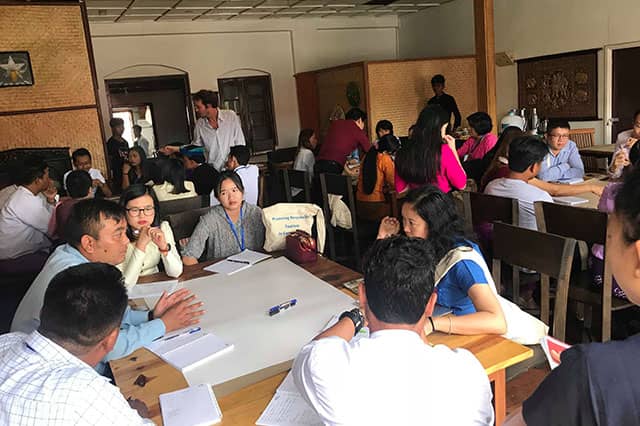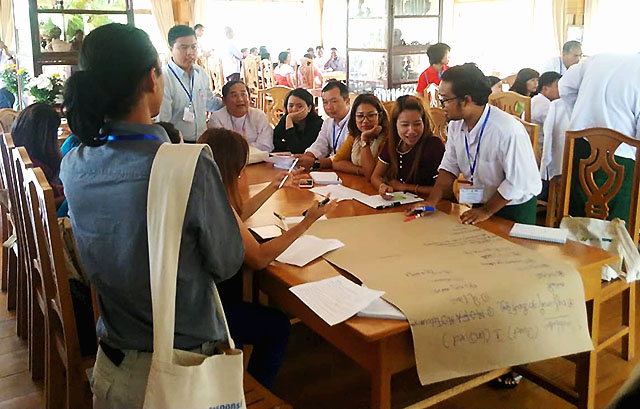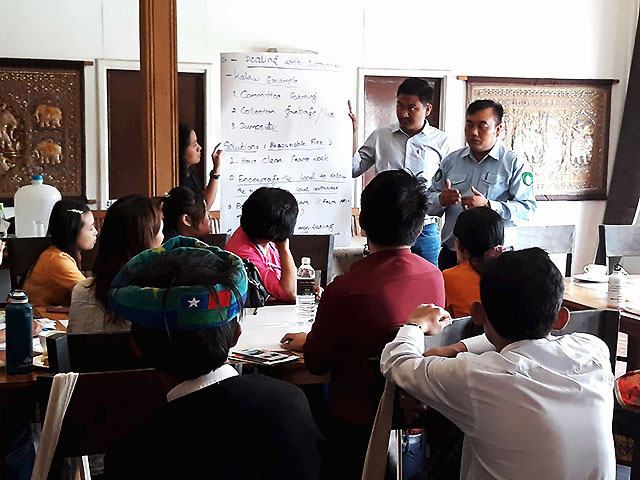Third National Conference on Communities and Tourism Focusses on Local Level Destination Management

Over 200 participants from government, private sector, local community-based tourism (CBT) organisations, development partners and independent experts attended the 3rd National Conference on Communities and Tourism in Kalaw from 6-8 June.
The agenda and programme documents are available here, together with the English and Burmese press releases.
The conference was organised by Hanns Seidel Foundation, Myanmar CBT Network, Myanmar Centre for Responsible Business (MCRB), and Myanmar Responsible Tourism Institute (MRTI) with the cooperation of the Ministry of Hotels and Tourism, and supported by the German Cooperation (GIZ). It brought together tourism businesses, guides and communities from across Myanmar, with a particular focus on those working in tourism in Shan State. HSF and MCRB have previously organised two Conferences on Communities and Tourism in December 2015 and June 2017 in Naypyidaw.
The opening day of the conference was addressed by U Tint Thwin, Director-General of the Ministry of Hotels and Tourism, German Ambassador, Dorothee Janetzke-Wenzel, and Daw Pyone Kaythi Naing, Pyithu Hluttaw member for Kalaw. Several speakers highlighted their programmes to support tourism SMEs, and local community tourism initiatives supported by GIZ, and UKAid's Business Innovation Facility. During the ceremony, Kalaw municipality was awarded the ASEAN Clean Tourism City Standard. This achievement was due to the combined efforts of the Kalaw municipal authorities, local residents, and the recently formed Kalaw Tourism Organisation (KTO), who worked to reduce rubbish burning by residents, and improve collection facilities. The KTO is a pioneer within Myanmar in bringing together the whole tourism value chain into one organisation i.e. hotels, guesthouses, restaurants, local tour and trekking operators, transport providers, and guides. This is a potential model for business-led destination management elsewhere in Myanmar.
Daw Pyone Kaythi Naing MP outlined her vision of Kalaw's tourism potential as a wellness retreat destination, building on recent initiatives such as the Kalaw half marathon, trekking, horse riding and cycling activities. This meant that the forests, natural and cultural heritage needed to be celebrated and preserved. She reflected on her experience in Luang Phabang, Laos, and Cameron Highlands, Malaysia, and emphasised the need for urban planning to be coordinated at township level.
Achim Munz, Country Director for HSF, linked the discussions at the Conference to the ongoing debate in Parliament on a new draft Tourism Law, in which decisions such as licensing of accommodation should be decentralised to State/Region level, or even closer to communities at a local administration and municipality level. MCRB and HSF have submitted a legal analysis (below) and proposals for amendment to the draft Tourism Law intended to achieve this, and discussed them with Parliamentarians in May and June.
The conference was an opportunity for networking and learning from existing tourism activities in Myanmar, with workshops on community tourism projects, accessing markets and developing products, waste management, responsible investment and destination management.
The organisers estimate that the three day conference was led to at least US$20,000 of funds injected into Kalaw’s economy, as a result of accommodation, food and beverage and transport services. Since many participants extended their stay to enjoy local ‘green season’ tourism in Southern Shan State, the actual contribution to the local economy may have been significantly more.
Providing conference-branded, refillable aluminium water bottles to all participants, and making water dispensers available at meeting venues is estimated to have led to 1800 500ml plastic water bottles not being used. MCRB has created ‘green meeting guidelines’ in English and Burmese to help event organisers to #beatplasticpollution.
Read also
- Tourism Sector
- New Report and Upcoming Webinar on Human Rights in Tourism
- White Paper on Tourism in Myanmar
- Planning for a Brighter Future in Mrauk U: Cultural Heritage and Tourism Management
- 4th National Conference on Communities and Tourism 2019
 English
English မြန်မာ
မြန်မာ မြန်မာ (unicode)
မြန်မာ (unicode)














